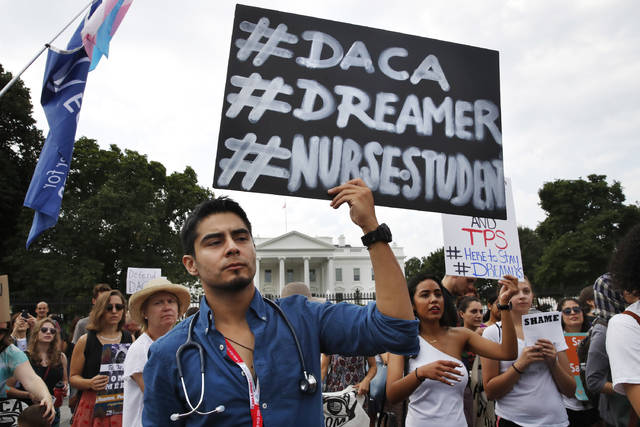Judge upholds order for Trump administration to restore DACA

ASSOCIATED PRESS / 2017
Carlos Esteban, 31, of Woodbridge, Va., a nursing student and recipient of Deferred Action for Childhood Arrivals, known as DACA, rallies with others in support of DACA outside of the White House on Sept. 5, 2017. A federal judge today upheld his previous order to revive DACA.
A federal judge today upheld his previous order to revive an Obama-era program that shields some 700,000 young immigrants from deportation, saying that the Trump administration had failed to justify eliminating it.
Judge John D. Bates of the U.S. District Court for the District of Columbia gave the government 20 days to appeal his decision. But his ruling could conflict with another decision on the program that a federal judge in Texas is expected to issue as early as next week.
The Trump administration announced late last year that it would phase out the program known as Deferred Action for Childhood Arrivals, or DACA, which protects unauthorized young adults from deportation and grants them two-year renewable work permits. The administration argued that President Barack Obama had overstepped his authority and circumvented Congress when he created the program in 2012.
The decision to end the program has faced numerous legal challenges. Currently, the government must continue accepting applications to renew DACA status, if not new applications from those who meet the criteria to qualify. DACA recipients — often called “Dreamers” — typically were brought to the United States illegally as children through no choice of their own.
Bates ruled in late April that the administration must restore the DACA program and accept new applications. He had stayed his decision for 90 days to give the Department of Homeland Security, which runs the program, the opportunity to lay out its reasons for ending it.
Kirstjen Nielsen, the homeland security secretary, responded last month, arguing that DACA would likely be found unconstitutional in the Texas case and therefore must end. She relied heavily on the memorandum that her predecessor, Elaine C. Duke, had issued to rescind the program and said the department had the discretion to end the program, just as the department under Obama had exercised discretion to create it.
Don't miss out on what's happening!
Stay in touch with breaking news, as it happens, conveniently in your email inbox. It's FREE!
Bates, who was appointed by President George W. Bush, did not agree. He called the shutdown of the program “arbitrary and capricious” and said Nielsen’s response “fails to elaborate meaningfully on the agency’s primary rationale for its decision.”
Two federal judges, in New York City and in San Francisco, issued injunctions this year ordering the government to keep the program. But neither of those rulings required that the government accept new applications, as the ruling by Bates does. The earlier decisions are pending before appeals courts.
Meanwhile, the state of Texas and several other plaintiffs have sued the government to rescind the program, contending it is illegal.
The District of Columbia lawsuit was brought by the NAACP, Microsoft and Princeton University. The DACA program has broad bipartisan support in the business and academic worlds.
Christopher L. Eisgruber, the president of Princeton, hailed the court’s decision. “Princeton University’s continued success as a world-class institution of learning and research depends on our ability to attract talent from all backgrounds, including Dreamers,” he said. Brad Smith, the president of Microsoft, said that finding a solution for DACA “has become an economic imperative and a humanitarian necessity.”
Since the 2016 presidential campaign, the young people who benefited from DACA have seen their hopes alternately elevated and dashed, sometimes in the space of a week. Neither a flurry of court decisions nor horse-trading in Congress has settled the issue.
In a statement today, United We Dream, an organization that represents Dreamers, offered a sobering assessment: “The situation for DACA beneficiaries remains dangerous and unstable, as we do not know how the administration will respond, and there are other court cases in progress.”
© 2018 The New York Times Company



